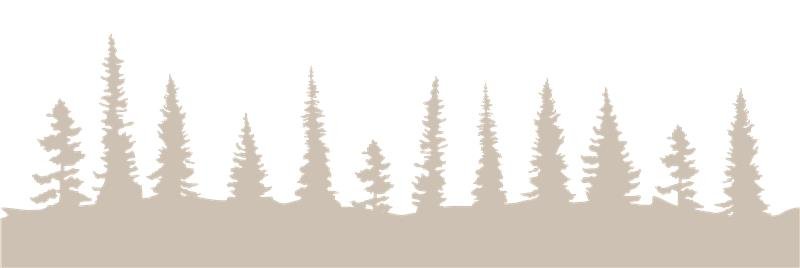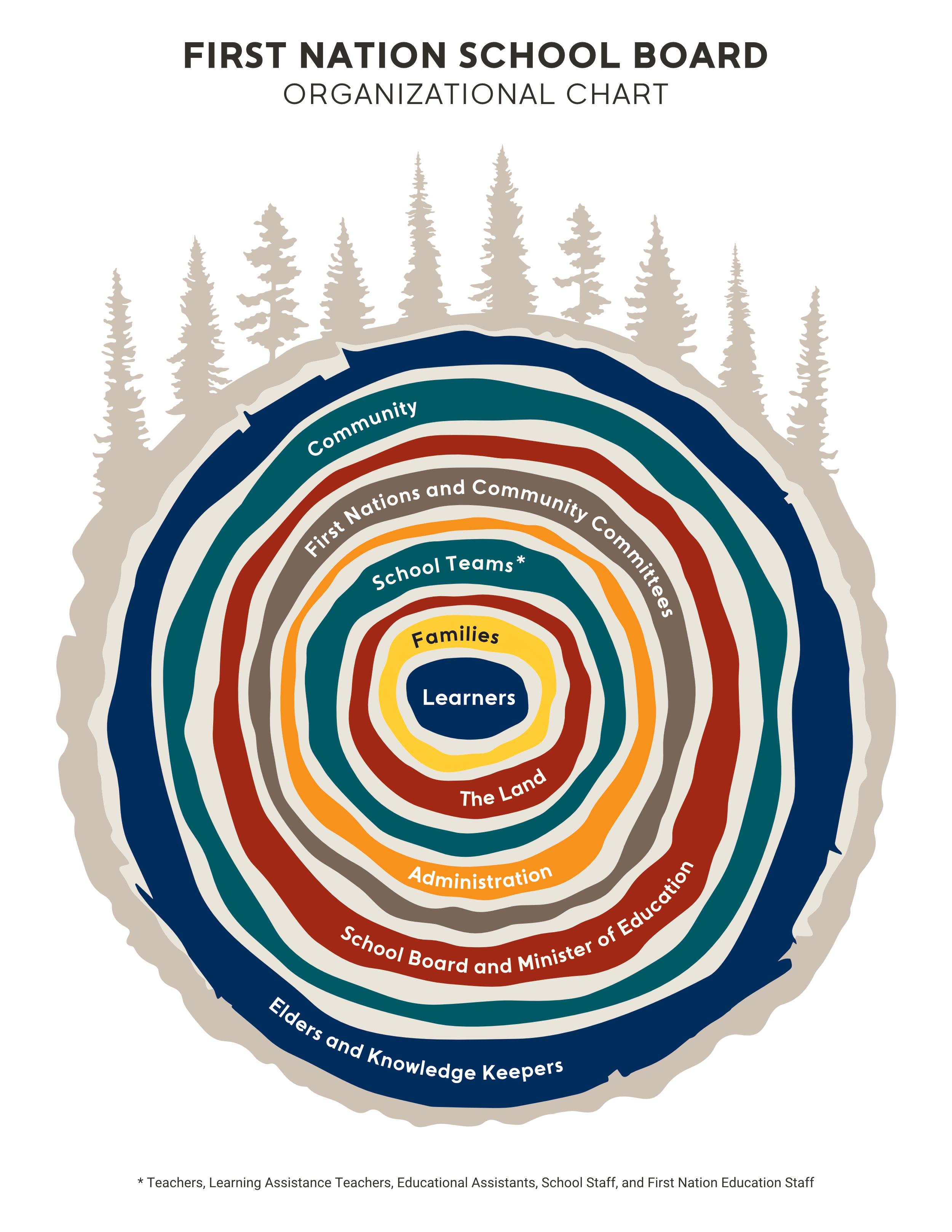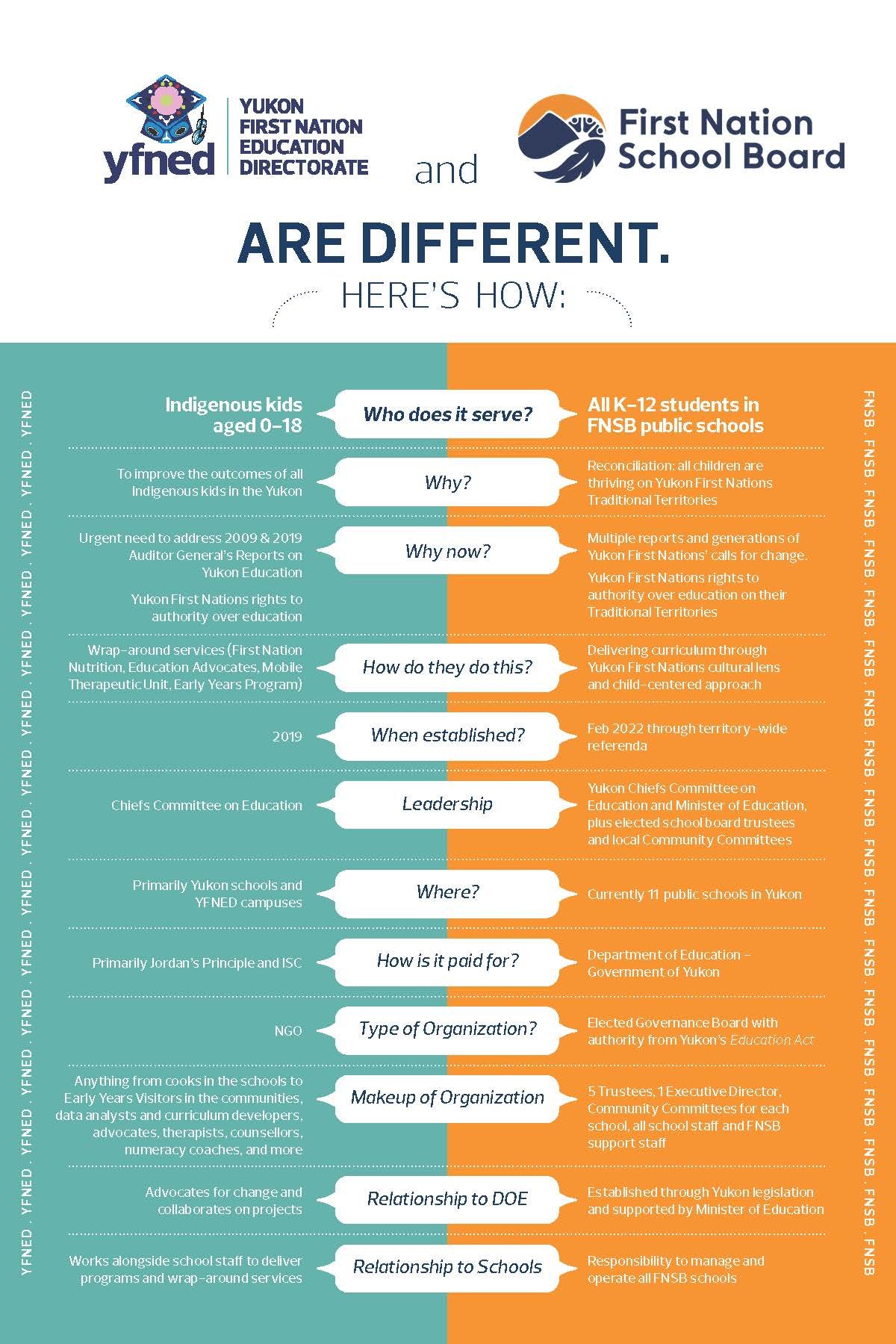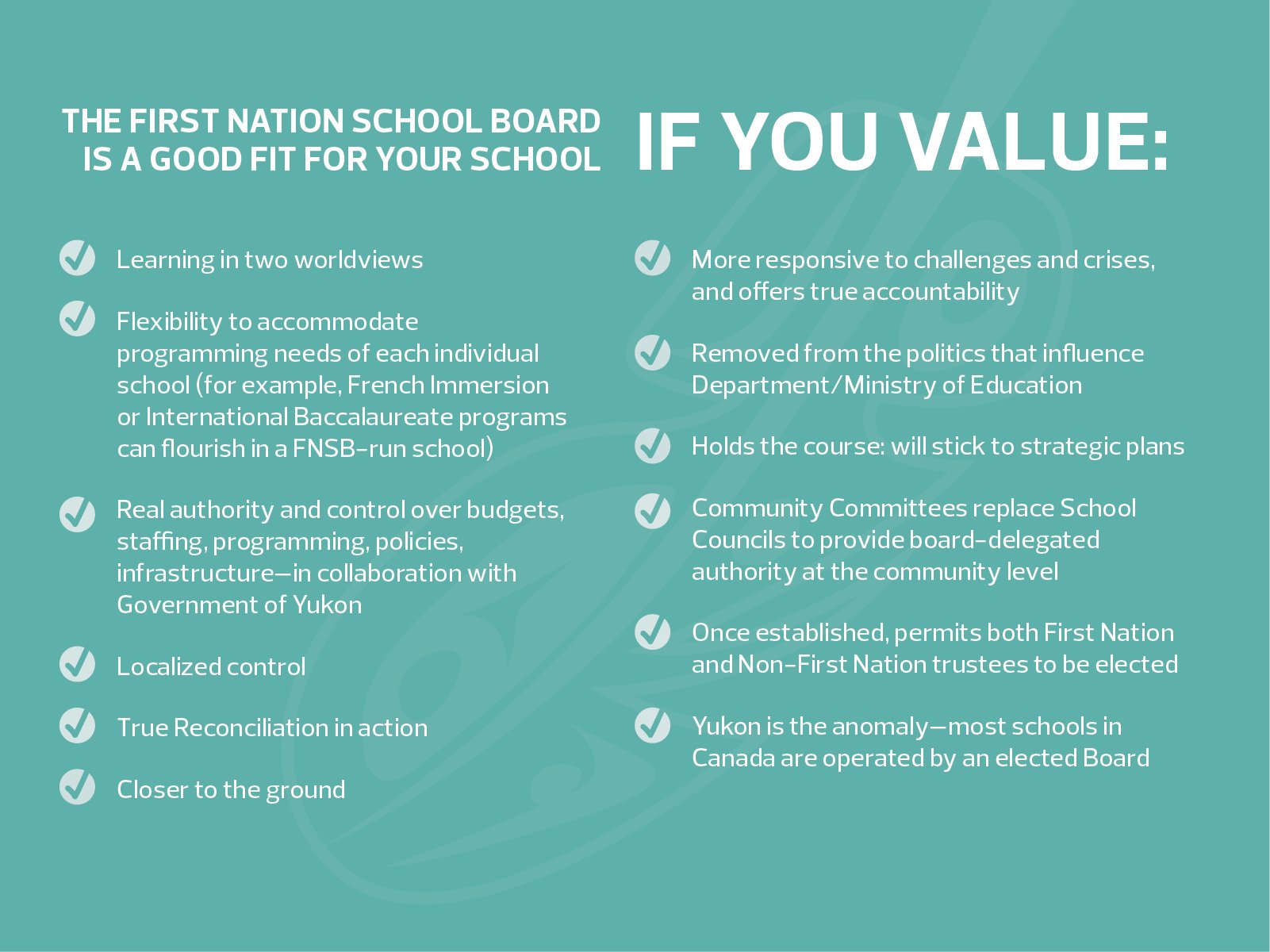Frequently Asked Questions
-
Every child matters. The Yukon’s First Nation School Board is critical to producing better outcomes for Yukon First Nations students while also benefitting every Yukon student it serves.
Nothing changes until something changes and there have been formal calls to change Yukon education system from as far back as Together Today For Our Children Tomorrow in 1973. The First Nation School Board is changing the system and doing better for all students.
It is clearly laid out in Yukon First Nation Final Agreements and the Kiwya Report that Yukon First Nations require involvement in public schools on their territories. The school board provides a bridge between Yukon First Nations and our public schools, which will only strengthen and fortify over time.
-
In general, Yukon First Nations methods and practices of teaching (pedagogy) incorporate land-based, multi-generational, strength-focused, and learner-centered techniques.
At FNSB schools, we are working to ensure full integration of local First Nation culture and language into all learning environments and curriculum. There is literacy and history in our stories, our cultural practices are full of science and math, social sciences and civics are embedded in our ceremonies and protocols, physical education is integral to our activities on the land, the list goes on.
Our local languages and histories exist no where else in the world and all learners going to school on these lands have the honour and privilege of learning and holding these unique teachings.
The advantages of learning from two worldviews equip students to be rooted in the culture of their homeland and be prepared for the modern world.
-
The school board honours the rights of Yukon First Nations to have authority over education while also enabling true collaboration with Yukon government and the wider Yukon community. It also offers an opportunity for our students to equally honour and benefit from two worldviews – Yukon First Nations balanced with western/European.
-
Board-run schools continue to use the BC Curriculum, but tailor the programming, lesson delivery and assessment methods to include the most up-to-date science and Yukon First Nations ways of knowing, being and doing.
-
Each school operates differently from the next, reflecting the needs of the particular community and student body however, one can expect to see increased on-the-land and experiential learning, increased First Nation Language instruction, Elders in the classroom, and specialized teaching and assessment practices.
First Nations-run schools across Canada report significant improvements in academic outcomes and graduation rates for their students. This is because normalizing low expectations of our learners and excluding them, their families and communities from directing their educational journey is an act of colonialism.
-
The Yukon’s education system has failed too many students - especially rural, special needs, and First Nations students. There are many studies, reports and incidents that illustrate this:
The 2009 and 2019 Auditor General’s Reports on Education offered an alarming assessment of Government of Yukon’s inability to meet the needs of First Nations, rural, and special needs learners in the territory.
2019/2020 Review of Inclusive and Special Education findings showed that, in many cases, students’ learning needs were not being met, with devastating consequences.
2020/21 Attendance Audit by the Yukon Child and Youth Advocate Office identified six (6) areas of concern as systemic barriers to school attendance.
2025 Review of Systemic Racism in Yukon Education from the First Nations Education Commission, the Yukon First Nation Education Directorate and the Yukon Child and Youth Advocate Office highlights continued, wide-spread actions that devalue and mistreat Indigenous culture and people.
Yukon First Nations Leaders have also been calling for changes in the Yukon Education system from as far back as Together Today for Our Children Tomorrow (1973), the Kwiya Report (1987), and the Joint Education Action Plan (2014-2024).
-
As FNSB schools are accountable to the Education Act, and follow the BC Curriculum, the same graduation requirements and certificates are upheld (e.g., Certificate of Graduation, a.k.a Dogwood Diploma and Adult Graduation Diploma, a.k.a. Adult Dogwood).
While we do not support the School Completion Certificate, a.k.a. Evergreen Certificate for most students, this may be an option for those with significant IEPs (Individual Education Plans).
For more information, please look at the Graduation Planner.
-
The Yukon First Nation Education Directorate (YFNED) is a completely separate organization from FNSB (First Nation School Board).
Under the direction of the Chiefs Committee on Education, YFNED was tasked with supporting the process for the establishment of the FNSB but they are not the same organization.
The FNSB operates public schools and serves all k-12 students at those schools. The YFNED serves Indigenous kids aged 0-18. For a breakdown of the differences between YFNED and FNSB, see our infographic.
-
No. All students in the Yukon are welcome at FNSB-run schools. They provide a vigorous education meeting a high-level of academic standards – taught through the cultural worldview and pedagogy of Yukon First Nations.
In the communities, First Nations students do not have priority enrollment over any other student living in the attendance area of the school.
In Whitehorse, where we have only two FNSB schools in operation, all currently-enrolled students will maintain their enrollment – never will a non-First Nations student lose their spot to free spaces for First Nations students. However, for kindergarten enrollment, there will be priority given to First Nations students only if space is limited, with a lottery occurring after that (as needed).
-
This is an inclusive, student-centred model whereby all children are served equally, based on need. FNSB-run schools put the child at the centre of all decisions so that anyone coming into our system will be honoured and served. All students will continue to be served by Student Support Services within the Department of Education, as well as by FNSB specialized supports.
-
All Yukon students are welcome to enroll at FNSB Schools.
In the Communities
All rural Yukon students have a right to enroll in the local FNSB school and can be registered in their community. Most of our schools in the communities have 2 Kindergarten starting points. Children can start with either:
Early Kindergarten (K4) if they’re 4 years old on or before December 31; or
Kindergarten (K5) if they’re 5 years old on or before December 31.
Contact the school to register your child. The school will let you know if they require online or paper-based registration. If it's paper-based, the school will provide all the necessary forms.
In Whitehorse
Go to: https://yukon.ca/en/register-child-school#register-your-child-for-kindergarten
Follow the instructions detailed on this website to complete your online registration for one of our Whitehorse-based schools.
The Education Area for our schools encompasses the entire Yukon and is not based on residential catchment areas. In Whitehorse, any student, no matter where they live in the city, can apply to enroll in one of our 2 urban schools: Takhini Elementary or Grey Mountain Primary. We ensure school busing is available for all students attending these schools.
The FNSB will strive to accommodate all students interested in enrollment at our urban schools.
If demand for enrollment exceeds classroom availability, enrollment will be prioritized on the following scale:
Yukon First Nations students have a right to attend a FNSB school, regardless of where they live in the city and will be given first priority.
Siblings of students already enrolled in one of our Whitehorse-based schools will be given second priority.
Students residing in the adjacent residential areas (following the school’s former “attendance area” catchment) and/or other Indigenous students will be given third priority.
A lottery system will be employed for all other students.
Please contact ruby.grant@fnsb.ca for additional information.
FAQ’s for School Staff
-
No. This is an inclusive model whereby all qualified teachers are welcome to teach in these schools.
-
First Nation School Board staff work with each school community to assess the training needs and interests among school staff.
FNSB-tailored PD is provided to all FNSB school staff at our annual Ed Camp in August and is developed in-line with our Strategic Plan and Action Areas of Focus (Literacy, Numeracy, High School, Early Learning, Whole Child and Land and Language).
All FNSB educators must also uphold all required professional development mandated within the Education Act.
-
Staffing and Human Resources policies and procedures are managed and implemented by the First Nation School Board, incompliance with the Education Act and applicable Collective Agreements.
-
Mandated assessments are implemented across all Yukon schools. In addition, FNSB has mandated additional literacy and numeracy assessments for our schools based on the most up-to-date science of how we learn number sense and how to read, write.
Please see our Literacy and Numeracy pages for more details.
Our Whole Child and Land and Language Teams are also in the process of developing a learner-focused, school-based wellness survey with external support from Aaniish Naa Gegii Child Health and Well-Being Measure. The survey will be piloted with three FNSB schools in the 2025-2026 school year.
Board Governance
-
The First Nation School Board maintains a Strategic Plan and conducts data collection and analysis needed to track progress towards these goals. With flexibility and localized control, FNSB is better able to meet the needs of each individual school community it serves.
Check out our full Strategic Plan and Annual Reports for more information about our goals and how we are achieving them.
-
The First Nation School Board is accountable to the Education Act including Section 7 which requires schools to care and look after all students to the highest standards. The Board is accountable to the Minister of Education and Chiefs Committee on Education, as well as to the Community Committee established for each school community.
If a parent has an issue, they raise it with the Community Committee. If a teacher has an issue, they can raise it through their unionized grievance process.
-
The FNSB works with the Department of Education to establish a Transfer Payment Agreement from the territory’s existing Education budget (~$272 million).
Full financial reports can be found in every Annual Report.
Local Management of Schools - Community Committees
-
The First Nation School Board provides for the local, First Nation-led management of schools through Community Committee Agreements.
Community Committee Agreements are negotiated between the First Nation School Board and local Yukon First Nations to set up these committees and specify their authorities and duties. These committees govern the operation and management of the school.
These committees share agreed-to aspects of the First Nation School Board’s authority under the Agreement for their respective schools. This includes things like approving locally-developed curricula, establishing school rules and policies, setting the school calendar, and finalizing the School Growth Plan.
-
Currently, 10 of 11 FNSB schools have a Community Committee in operation.
For more details, see our Community Committees page.
Future Referenda and Elections
-
At any point, school councils can submit a resolution – or school communities a petition – to the Minister of Education and Executive Director of FNSB requesting their school join the First Nation School Board.
Once received, the First Nation School Board of Trustees, Chiefs Council on Education, and the Minister will decide whether another referenda will be opened.
-
There is a provision which allows parents that have a child attending a FNSB school to run as a trustee for the Board. In the establishment of the Board, five (5) trustees are elected who must meet the “Oath of Qualifications.”
-
Information about any upcoming elections will be posted on this website and at: www.electionsyukon.ca

Infographics






